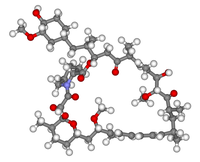
Photo from wikipedia
Malignant peripheral nerve sheath tumors (MPNSTs) are soft-tissue sarcomas that frequently arise in patients with neurofibromatosis type 1 (NF1). Most of these tumors are unresectable at diagnosis and minimally responsive… Click to show full abstract
Malignant peripheral nerve sheath tumors (MPNSTs) are soft-tissue sarcomas that frequently arise in patients with neurofibromatosis type 1 (NF1). Most of these tumors are unresectable at diagnosis and minimally responsive to conventional treatment, lending urgency to the identification of new pathway dependencies and drugs with potent antitumor activities. We therefore examined a series of candidate agents for their ability to induce apoptosis in MPNST cells arising in nf1/tp53-deficient zebrafish. In this study, we found that DNA topoisomerase I-targeted drugs and mTOR kinase inhibitors were the most effective single agents in eliminating MPNST cells without prohibitive toxicity. In addition, three members of these classes of drugs, either AZD2014 or INK128 in combination with irinotecan, acted synergistically to induce apoptosis both in vitro and in vivo. In mechanistic studies, irinotecan not only induces apoptosis by eliciting a DNA damage response, but also acts synergistically with AZD2014 to potentiate the hypophosphorylation of 4E-BP1, a downstream target of mTORC1. Profound hypophosphorylation of 4E-BP1 induced by this drug combination causes an arrest of protein synthesis, which potently induces tumor cell apoptosis. Our findings provide a compelling rationale for further in vivo evaluation of the combination of DNA topoisomerase I-targeted drugs and mTOR kinase inhibitors against these aggressive nerve sheath tumors.
Journal Title: Oncogene
Year Published: 2019
Link to full text (if available)
Share on Social Media: Sign Up to like & get
recommendations!